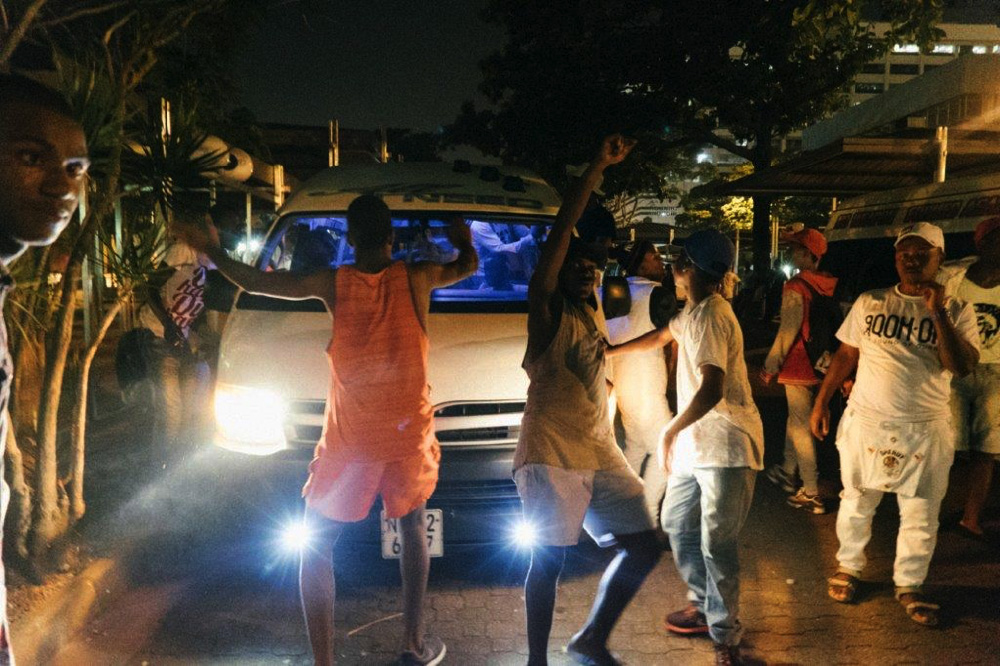Like kwaito, gqom has a symbiosis with taxi culture – the better (and louder) the gqom, the happier the taxi passengers.

With over two million views on YouTube, “Wololo” is the biggest South African song of the year and the breakout hit for Babes Wodumo, who’s become a media darling on the back of its success. She’s also being referred to to as the Queen of a distinctly KwaZulu-Natal dance sound: gqom.
The genre’s signifiers are ominous bass pressure, cracking and jagged tribal percussion, and clipped vocal syllables, and while Babes is enjoying the mainstream limelight (she’s fully booked until February 2017, and the “Wololo video has been pulled from YouTube for a copyright clash – over the name), the bulk of the purveyors of gqom lurk in the KZN underground and on niche websites like kasimp3.
However, the wider world is starting to take notice. In 2013, UK-born now Knysna-based producer Jumping Back Slash – who’s been incorporating elements of gqom into his work for a while – spoke about it to The Fader. Eclectic UK label Blank Mind has just released a four-tracker from AudioBoyz, and last year, London-based label Goon Club Allstars released a split EP from Rudeboyz and Menchess. That same label is about to release an EP from the scene’s most high profile proponent, DJ Lag, who’s also off on a tour of Asia and Europe in 2016 – including a set at Berlin’s legendary Berghain.
Here’s a teaser from his EP.
Then there’s Crudo Volta. The Italian label who released the Gqom Oh! compilation earlier this year (on their new Gqom Oh! sub-label), and followed it up with the revealing ‘Woza Taxi – Gqom Secret Stash Out Of The Locations’ documentary (which you can watch below). The genre is currently thriving in both the chisa nyamas of the townships and the pubs of Durban’s inner city, all the while soundtracking open-minded dancefloors globally.
The ‘Woza Taxi’ film is not the first time gqom has been explored visually. Its uniquely South African characteristics were the jump-off point for Spoek Mathambo’s excellent examination of SA’s dance nation, ‘Future Sound of Mzansi’ from 2015. In it, some of the scene’s personalities – Rocksilver, Naked Boys, Menchess, Massive Q and Andile T of Rude Boys – talk about the influence of kwaito demi-god L’vovo Derrango on gqom, the style’s broken beats and lack of fully-formed vocals, its creators – underground cats in the kasi using Fruity Loops – but mainly its ability to inspire rapture on the ‘floor.
Named for the Zulu word for “drum” or “hit”, gqom is described by Black Coffee in the same doccie as “a mixture of kwaito, electro and house”, and his observation that it emerged alongside an ecstasy scene is backed up by Formation Boyz in ‘Woza Taxi’.
Personally I can hear how the sound translates so well internationally. Unlike kwaito it’s virtually vocal-free, and unlike the deep house being produced in the kasi it has drive rather than often aimless drift. The off-kilter percussion has cousins in genres like funky, footwork and grime, and it has a dark rawness akin to acid house and early jungle.
While it seems to have settled into a clear formula, outsider SA producers like the aforementioned Jumping Back Slash, Maramza and Jakinda have started twisting its tropes into new and intriguing shapes. It’ll keep developing – possibly splintering into sub-genres – if producers in the US and Europe begin doing the same, but gqom as is is likely has a healthy future in South Africa. Perhaps all it needs is that one hit to step up over the parapet and cross over into the mainstream to raise its profile and its reach beyond Durban.
And so to ‘Woza Taxi’, which explores Durban and surrounds and taps into the thoughts of producers like DJ Kaybee, DJ Mabheko, Mafia Boyz, Formation Boyz (getting the picture?) and more. Like kwaito, gqom has a symbiosis with taxi culture – the better (and louder) the gqom, the happier the taxi passengers. Mabheko describes it as “African electro” created with broken sounds, unlike the linear deep house that’s so massive elsewhere in Mzansi.
Gqom is also collaborative – some crews run five deep – intuitive rather than cerebral, deeply rooted in township culture, a perfect fit for the bhenga dance and “qo”, or ecstasy. This latter quality is also cited as a reason the music is hardly playlisted on local radio, even while it enjoys international acclaim.
This last segment of Crudo Volta’s 23-minute short is confusing as an unnamed radio presenter rambles about playlisting policies – and possibly payola – but it hardly ruins what is a well-shot and craftily soundtracked introduction to a genre that’s again putting South African dance music on the international map.
Watch ‘Woza Taxi’:






